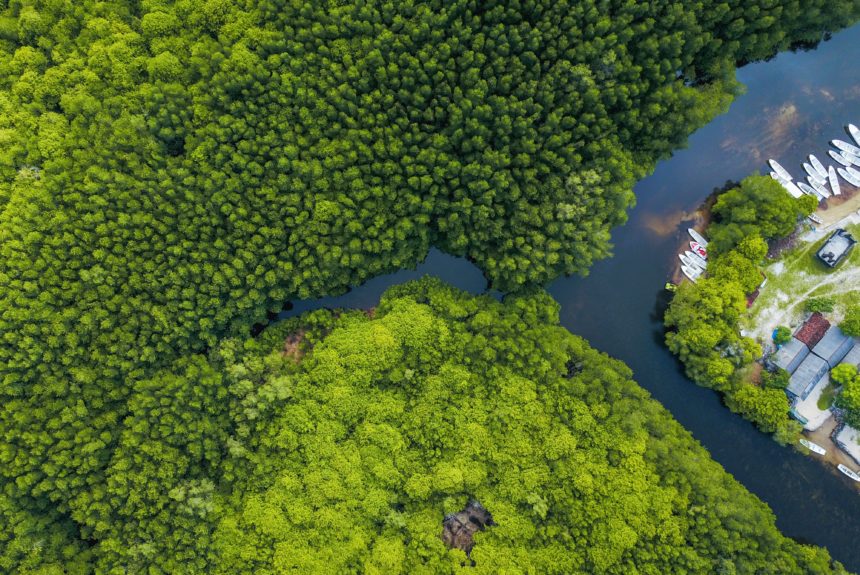Blue Carbon, which is the carbon stored in coastal and oceanic ecosystems, is a significant nature-based climate solution that is often overlooked. While many natural climate solutions are terrestrial, Blue Carbon sequesters CO2 in seagrass, mangrove forests, marshes, and other coastal ecosystems.
Given Blue Carbon’s immense sequestration potential and the growing population of coastal communities, policymakers should look for ways to bolster Blue Carbon and coastal ecosystems. Moreover, as climate change increasingly threatens coastal communities, more resilient ecosystems will play a crucial role in helping us adapt to the impacts of natural disasters, flooding, and erosion. This will protect communities, enhance biodiversity, and safeguard coastal economies.
Fact vs Myth
- FACT: 83% of the global carbon cycle is circulated through the ocean.
- MYTH: Terrestrial forests sequester more carbon per unit area than coastal ecosystems.
- FACT: Protecting coastal ecosystems is beneficial to our economy and environment.
The Importance of Blue Carbon
- Blue Carbon is important to reduce global and domestic emissions.
- While representing only 2% of total ocean surface area, coastal communities and ecosystems sequester half of the ocean’s total carbon footprint.
- Coastal ecosystems have the capacity to store up to 233 million tons of carbon per year, a rate that is ten times higher than forests on an acre-by-acre basis.
- For example, the full restoration of the Puget Sound Estuary could result in 8.9 million tons of CO2 sequestered over 100 years, according to a study conducted by Washington State University.
- Resilient coastal ecosystems protect communities from the impacts of natural disasters.
- Mangrove forests can reduce wave height by up to 66% per 100 meters of mangroves, effectively lessening the impacts of storm-related flooding.
- Salt marshes protect shorelines from erosion by buffering wave action and trapping sediment.
- Blue Carbon and coastal ecosystems are ecologically beneficial for the Earth.
- Both freshwater and saltwater marshes provide habitat for migratory water birds and absorb excess nutrients that would otherwise be harmful to wildlife.
- Mangroves house manatees and improve the quality of water by lessening harmful runoff.
- Seagrass reduces erosion of coastlines and improves water quality.
Markets vs. Mandates
- While the concept of Blue Carbon is relatively new, there have been a number of successful coastal resiliency projects.
-
- The Louisiana Coastal Master Plan is a $50 billion project that is restoring Louisiana’s coastline.
- Since 2007 some 135 projects have been funded or completed, resulting in more than 36,000 acres of land being restored or maintained and 282 miles of levee improvements completed.
- The Nature Conservancy and the California Coastal Conservancy published their Hope for the Coast initiative in California, to explore strategies that can preserve and protect the Pacific coastline.
- The Louisiana Coastal Master Plan is a $50 billion project that is restoring Louisiana’s coastline.
- While terrestrial carbon markets are much more established, private actors are starting to expand this to Blue Carbon as well. As this grows, more and more private investments will flow to coastal ecosystem restoration efforts.
- Certain government programs may lead to the destruction of coastal ecosystems.
- Because its rates fail to accurately reflect risk, the National Flood Insurance Program (NFIP) incentivizes construction on coastlines and high flood-prone areas.
How to Further Enhance Blue Carbon
- The conservation of coastal ecosystems is primarily a local and state issue. Federal policies should be enacted that empower local and state leaders.
- There are several ways in which federal policies can empower private-sector and local conservation efforts.
- Continue and expand grant programs that fund coastal resiliency projects such as those administered by the National Oceanic and Atmospheric Administration.
- Empower local communities and governments through conservation easement programs.
- Accredit and certify carbon market initiatives.
- Through the Army Corps of Engineers, support nature-based infrastructure in coastal resiliency planning.
- Update the National Flood Insurance Program (NFIP)’s pricing methodology to stop incentivizing new construction in high-risk coastal areas that may harm ecosystems.
Summary
- Blue Carbon has enormous Co2 sequestration potential.
- There is robust private sector involvement in the advancement of Blue Carbon.
- By investing in natural and coastal infrastructure and updating the NFIP’s pricing methodology, we can continue to harness the power of the ocean to lower carbon emissions.


